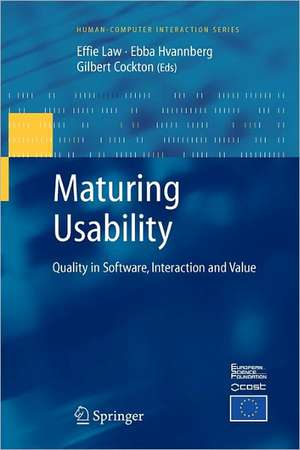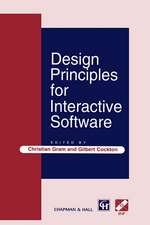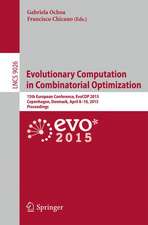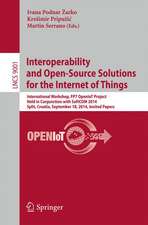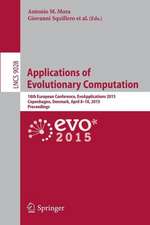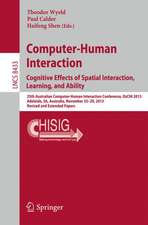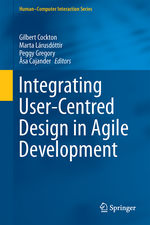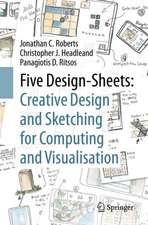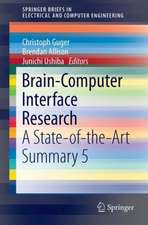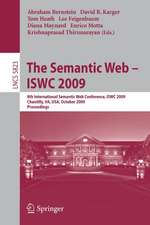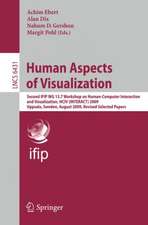Maturing Usability: Quality in Software, Interaction and Value: Human–Computer Interaction Series
Editat de Effie Lai-Chong Law Cuvânt înainte de R. Jeffries Editat de Ebba Hvannberg Cuvânt înainte de D. Wixon Editat de Gilbert Cocktonen Limba Engleză Paperback – 28 oct 2010
Divided into three parts, ‘Quality in Software’ looks at how using development tools can enhance the usability of a system, and how methods and models can be integrated into the process to help develop effective user interfaces. ‘Quality in Interaction’ addresses theoretical frameworks on the nature of interactions; techniques and metrics for evaluation interaction quality; and the transfer of concepts and methods from research to practice. Finally, ‘Quality in Value’ assesses the impact that a system has in the real world, focusing on increasing the value of usability practice for software development and on increasing value for users.
A balance between theoretical and empirical approaches is maintained throughout, and all those interested in exploring usability issues in human-computer interaction will find this a very useful book.
| Toate formatele și edițiile | Preț | Express |
|---|---|---|
| Paperback (1) | 994.92 lei 6-8 săpt. | |
| SPRINGER LONDON – 28 oct 2010 | 994.92 lei 6-8 săpt. | |
| Hardback (1) | 1001.35 lei 6-8 săpt. | |
| SPRINGER LONDON – 15 oct 2007 | 1001.35 lei 6-8 săpt. |
Din seria Human–Computer Interaction Series
- 20%
 Preț: 664.44 lei
Preț: 664.44 lei - 20%
 Preț: 375.54 lei
Preț: 375.54 lei - 20%
 Preț: 817.55 lei
Preț: 817.55 lei - 20%
 Preț: 822.51 lei
Preț: 822.51 lei - 20%
 Preț: 667.75 lei
Preț: 667.75 lei - 20%
 Preț: 938.66 lei
Preț: 938.66 lei - 20%
 Preț: 991.60 lei
Preț: 991.60 lei - 20%
 Preț: 655.85 lei
Preț: 655.85 lei - 20%
 Preț: 657.16 lei
Preț: 657.16 lei - 20%
 Preț: 645.31 lei
Preț: 645.31 lei - 20%
 Preț: 994.26 lei
Preț: 994.26 lei - 15%
 Preț: 658.05 lei
Preț: 658.05 lei - 20%
 Preț: 654.21 lei
Preț: 654.21 lei - 20%
 Preț: 644.48 lei
Preț: 644.48 lei - 20%
 Preț: 1621.89 lei
Preț: 1621.89 lei - 20%
 Preț: 309.25 lei
Preț: 309.25 lei - 20%
 Preț: 1175.42 lei
Preț: 1175.42 lei - 20%
 Preț: 659.97 lei
Preț: 659.97 lei - 20%
 Preț: 219.15 lei
Preț: 219.15 lei - 20%
 Preț: 334.86 lei
Preț: 334.86 lei - 20%
 Preț: 969.84 lei
Preț: 969.84 lei - 20%
 Preț: 642.19 lei
Preț: 642.19 lei - 20%
 Preț: 314.39 lei
Preț: 314.39 lei - 20%
 Preț: 661.14 lei
Preț: 661.14 lei - 20%
 Preț: 995.89 lei
Preț: 995.89 lei - 20%
 Preț: 752.58 lei
Preț: 752.58 lei - 20%
 Preț: 990.30 lei
Preț: 990.30 lei - 20%
 Preț: 990.12 lei
Preț: 990.12 lei - 20%
 Preț: 336.21 lei
Preț: 336.21 lei - 20%
 Preț: 334.71 lei
Preț: 334.71 lei - 20%
 Preț: 312.62 lei
Preț: 312.62 lei - 20%
 Preț: 331.74 lei
Preț: 331.74 lei - 20%
 Preț: 646.80 lei
Preț: 646.80 lei - 20%
 Preț: 994.40 lei
Preț: 994.40 lei - 20%
 Preț: 334.86 lei
Preț: 334.86 lei - 20%
 Preț: 329.76 lei
Preț: 329.76 lei - 20%
 Preț: 332.24 lei
Preț: 332.24 lei - 20%
 Preț: 992.11 lei
Preț: 992.11 lei - 20%
 Preț: 650.40 lei
Preț: 650.40 lei - 20%
 Preț: 337.00 lei
Preț: 337.00 lei - 20%
 Preț: 332.39 lei
Preț: 332.39 lei - 20%
 Preț: 1279.86 lei
Preț: 1279.86 lei - 15%
 Preț: 636.12 lei
Preț: 636.12 lei - 20%
 Preț: 336.67 lei
Preț: 336.67 lei - 20%
 Preț: 1000.70 lei
Preț: 1000.70 lei - 20%
 Preț: 645.14 lei
Preț: 645.14 lei - 20%
 Preț: 646.80 lei
Preț: 646.80 lei - 20%
 Preț: 656.03 lei
Preț: 656.03 lei
Preț: 994.92 lei
Preț vechi: 1243.64 lei
-20% Nou
Puncte Express: 1492
Preț estimativ în valută:
190.43€ • 196.24$ • 160.77£
190.43€ • 196.24$ • 160.77£
Carte tipărită la comandă
Livrare economică 04-18 martie
Preluare comenzi: 021 569.72.76
Specificații
ISBN-13: 9781849966818
ISBN-10: 1849966818
Pagini: 456
Ilustrații: XXIV, 430 p.
Dimensiuni: 156 x 235 x 24 mm
Greutate: 0.64 kg
Ediția:Softcover reprint of hardcover 1st ed. 2008
Editura: SPRINGER LONDON
Colecția Springer
Seria Human–Computer Interaction Series
Locul publicării:London, United Kingdom
ISBN-10: 1849966818
Pagini: 456
Ilustrații: XXIV, 430 p.
Dimensiuni: 156 x 235 x 24 mm
Greutate: 0.64 kg
Ediția:Softcover reprint of hardcover 1st ed. 2008
Editura: SPRINGER LONDON
Colecția Springer
Seria Human–Computer Interaction Series
Locul publicării:London, United Kingdom
Public țintă
ResearchCuprins
Quality in Software.- Usability Evaluation of User Interfaces Generated with a Model-Driven Architecture Tool.- Software Quality Engineering: The Leverage for Gaining Maturity.- Connecting Rigorous System Analysis to Experience-Centered Design.- Tailoring Usability into Agile Software Development Projects.- Tailoring Usability into Agile Software Development Projects.- Quality in Interaction.- Systems Usability – Promoting Core-Task Oriented Work Practices.- Usability Work in Professional Website Design: Insights from Practitioners’ Perspectives.- Characterizations, Requirements, and Activities of User-Centered Design—the KESSU 2.2 Model.- Remote Usability Evaluation: Discussion of a General Framework and Experiences from Research with a Specific Tool.- Utility and Experience in the Evolution of Usability.- Quality in Value.- Usability and Users’ Health Issues in Systems Development – Attitudes and Perspectives.- Usability Evaluation as Idea Generation.- Putting Value into E-valu-ation.- HCI and the Economics of User Experience.- The Future of Usability Evaluation: Increasing Impact on Value.- A Green Paper on Usability Maturation.
Recenzii
From the reviews:
"This is a significant volume by numerous authors, all of whom are leaders in the usability community. … The steps taken by practitioners and academics to evolve the discipline to its current state are treated as well. … I highly recommend this book to all who have an interest in software usability. … could be used in a graduate course on usability theory, history, and ‘where is it going.’" (C. A. Wolfe, ACM Computing Reviews, November, 2008)
"This is a significant volume by numerous authors, all of whom are leaders in the usability community. … The steps taken by practitioners and academics to evolve the discipline to its current state are treated as well. … I highly recommend this book to all who have an interest in software usability. … could be used in a graduate course on usability theory, history, and ‘where is it going.’" (C. A. Wolfe, ACM Computing Reviews, November, 2008)
Textul de pe ultima copertă
"Maturing Usability" provides an understanding of how current research and practice has contributed towards improving quality from the perspectives of software features, interaction experiences and achieved value.
Divided into three parts, ‘Quality in Software’ looks at how using development tools can enhance usability of a system, and how methods and models can be integrated into the development process to produce effective user interfaces. ‘Quality in Interaction’ addresses theoretical frameworks on the nature of interactions; techniques and metrics for evaluation interaction quality; and the transfer of concepts and methods from research to practice. Finally, ‘Quality in Value’ assesses the impact that a system has in the real world, focusing on increasing the value of usability practice for software development and on increasing value for the users.
A balance between theoretical and empirical approaches is maintained throughout, and all those interested in exploring usability and emerging usage qualities in human-computer interaction will find this a very useful book.
Divided into three parts, ‘Quality in Software’ looks at how using development tools can enhance usability of a system, and how methods and models can be integrated into the development process to produce effective user interfaces. ‘Quality in Interaction’ addresses theoretical frameworks on the nature of interactions; techniques and metrics for evaluation interaction quality; and the transfer of concepts and methods from research to practice. Finally, ‘Quality in Value’ assesses the impact that a system has in the real world, focusing on increasing the value of usability practice for software development and on increasing value for the users.
A balance between theoretical and empirical approaches is maintained throughout, and all those interested in exploring usability and emerging usage qualities in human-computer interaction will find this a very useful book.
Caracteristici
Three major perspectives of evaluating quality are addressed, quality in software, quality in interaction and quality in value Includes chapters on new methods/approaches that will enhance the field of usability
